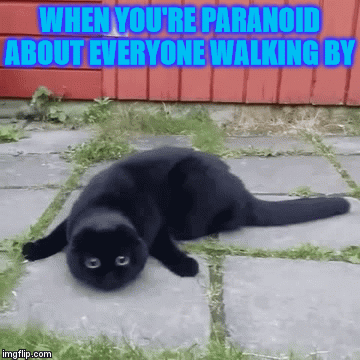Demonstrating Their Paranoid Style: Notes on The Interrogator

The Paranoid Style is the title of a 1964 essay I haven’t read but have read enough tweets about that I feel comfortable referencing it in the circles I run in (they haven’t read it either). "Paranoid Style" is also the title of a 2019 Bad Religion song about how there are bad people on both sides. It’s also the name of a band that I very much enjoy. This is an essay about the band. If you don’t read it, that’d show me. But when the day comes that you have to fake a working knowledge of this newsletter, I can’t promise that just skimming the tweets discussing it will suffice. Don’t blame me when the next big music-journalist oral history is a slew of critics talking about that one time you were at a party and you argued that, just because “The Boys Are Back In Town” is referenced in the lyrics of “The Return of the Molly Maguires," the recurring guitar motif must be a nod to Thin Lizzy. When the riff is clearly closer in mood to AC/DC’s “What’s Next to the Moon,” played with a tone reminiscent of Funeral At The Movies-era Shudder To Think. Imagine: a whole oral history—consisting of prominent substackers, previously undiscovered Pelly sisters, and every Jeff, Geoff, Jess, Jes, Mark, and Marc in the industry (as it were)—all laughing at you. If that kind of humiliation is your thing, go ahead and roll those dice. For everyone else…
The Interrogator begins with a Highway 61 Revisited siren whistle, some Bonnie St. Claire clap ‘n’ stomp, and—in the first thirty four seconds of the title track’s 2:34 runtime—the following flurry of words:
“You're tapin' up your knuckles, pullin' out the mutual fun
Shakin' like a scaredy-cat, hangin' with the one-hand guns
Sure, I've been around the block, but it doesn't make us neighbors
I don't make any promises, I don't sign any waivers
Put your name on the dotted line and go see the interrogator
Jesus, you're a tough guy, you're a sentimental son of a bitch
I find it unbecoming when you ask me just who I was with”

The Paranoid Style, as headed by the writer Elizabeth Nelson (and her husband, the Mendoza Line’s Timothy Bracy), is a critic’s band. Not in the “looks like Elvis Costello” sense. I won’t describe Nelson’s appearance. Ascribing physical characteristics to female identifying musicians is off the table for the foreseeable future. But I can say that Bracy has a strong chin. And if any of the other members of the band wear glasses, they have the good sense to take them off in promo photos. Rather, the Paranoid Style are a critic’s band in that they’re fronted by an actual rock critic. Nelson writes for The Ringer, Pitchfork, and Oxford American, as well as writing microblogs which discuss Elvis Costello’s songwriting, The Clash’s interpersonal dynamics, and the wind that runs through Randy Newman’s hair, all in the kind of Marcus, Greil-ian apocalyptic language that implies that art might actually matter, and which results in her being followed by a legion of the most tolerable record collector reply guys on the internet.

The trope of critics being failed musicians was always pretty much bullshit. Most olde-timey critics/musicians of note started as critics (or at least ‘zine writers) before crossing over. And, with the vast majority of contemporary critics having dreamed of assigning numbers to art since they were This-Heat-appreciaters-in-short-pants, the trope is still bullshit. Of course, there are exceptions within the bullshit. There are critics who play music—successfully enough to impress record collectors if not in-laws (or other, understandably jealous, critics)—whose music is perhaps not as well known as their criticism. Critics making viable music is not prevalent enough to shake off Swifties looking to hurt a writer’s feelings. And, within this niche, Nelson and her crew are singular.
Most rockers/writers have historically demarcated their critical output from their musical output, with the latter identity taking pains—like Batman tamping down Bruce Wayne’s brahmin —to not sound like the former. This is typically done by either the Metal Mike Saunders Method: pretending to be a cretin in the name of rock, roll, pure pop, or some such reverse-pretension. Or the Patti Smith Method: not hiding one’s smarts, but confining it to French stuff and Jesus. The Paranoid Style lean into a third way.
Musically, Nelson and Bracy draw from the entirety of what has been, depending on the time and market, known as college rock, DIY, indie, and garage rock. Plus nearly all the subcultures (mod, power pop, noise pop, twee, paisley underground, etc) which might fit under any of those umbrellas. A few years back, when reviewing Beth Wawerna’s excellent Bird of Youth project, I joked about how I was pretty sure that Wawerna was the only living artist directly referencing Green on Red. Well, in the case of both the music and lyrics of the Paranoid Style, the entire discography of Restless Records is the tip of the Trouser Press iceberg. There are so many music nerd/rock critic easter eggs in the Paranoid Style’s songs—puns on Nick Lowe songs, narratives dependent on Who minutia, direct They Might Be Giants quotes, a goddamn Belle & Sebastian cover (the one about the Dylan doc no less), a song simply called “Doug Yule”—that any listener who catches half of them is forced to contend with just how much of their life has been wasted learning Chuck Eddy’s liner notes for the Mekons live album (as opposed to learning how to fix cars and/or fight).
This is not to say that Nelson's lyrics are merely a series of in-jokes and insider baseball stats about every band who ever appeared on a free CMJ Certain Damage CD. She may exhibit an encyclopedic knowledge of the Dream Syndicate family tree, but the references are mixed and intertwined with an equally expansive grasp of history and literature less the sole purview of the black-rim eyeglasses 'n' flown flannel set. And all of it is utilized in service of themes which run the gamut from punk-Ed. geopolitics to the love-corruptions and small life victories which pop music depends on to not entirely suck. Yes, "Styles Makes Fights" has a line about "so many things that Pitchfork got wrong," but it also references Italian footballer Roberto Mancini and Italian boot-boy-er Benito Mussolini: with all references laid out as evidence for... well, I'm not sure what. But something that feels true and more than the sum of its parts. (Whether or not Americans referencing non-North American football is essentially the same as them making a Dream Syndicate reference is a discussion for a later time, and probably not even then.)
Further, a knowledge of source material is, to be clear, not required. I had never heard Bracy’s previous Mendoza Line band (it’s very good!), only really give a shit about the first Replacements LP (and will see you in hell before I call them “the ‘Mats”), and—while appreciating the early stuff and “hits”—I had never (prior to writing this essay) knowingly listened to an Elvis Costello album recorded after 1981 in its entirety (listening to Imperial Bedroom now… I don’t really like it!). You can trust me when I say that, fun as the easter eggs are, the music of Nelson & Bracy (both of whom, I just now realize I haven't made clear, write the music and lyrics) succeeds on its own merits.
The Interrogator is the band’s fourth album (plus four EPs) since they formed in 2012. Outside Nelson and Bracy, the organization’s membership has been loose and shifting. For all the wordiness and allusions, the songs of the Paranoid Style are decidedly front facing. The drums (Jon Langmead) are played with a kind of tight but unshowy drive that David Robinson used to keep the Cars out of the garage. The bass playing (William Corrin) is melodic and often lovely, doing what God intended a bass to do. The guitars—Bracy and the db’s Peter Holsapple—are sometimes honkey tonkin, sometimes classic/power-pop riffin’, sometimes adding a touch of new wave to all that truth. Never tedious or ornamental. Occasionally (as on the ballad, “Are You Loathsome Tonight?”) the guitars twang mournfully, but the players eschew atmospherics like the plague (with even the mood setting on the album’s short finale thankfully being more ‘80s Elton John than Daniel Lanois).
As for the singing, The Interrogator pushes Nelson’s vocals higher in the mix than any previous Style album. Considering Nelson’s lyrical fixations and predilections, this could have gone badly astray. There’s wordy folk rock, and then there’s the Capitol Steps. Luckily the singer and band pull it off, with the high mix serving to accentuate what was already the band’s main selling point; a frontperson unafraid of telling the listener exactly what is what, while helping themself to a Pall Mall from the pack in the listener’s shirt chest pocket. Some of this may be the way the band presents itself in album art; the front person as a kind of louche and threatening collector of tchotchkes and grievance, the whole band as a Who’s Afraid of Virginia Wolfe in waiting, all set in the intellectual mean streets of this nation’s Ashevilles. This is all further complexified/exemplified by how Nelson sings phrases like “son of a bitch” which, befittingly to the medium, comes out as naturally as an oath from a garage rock lifer and, simultaneously, as affected as from a short story writer who maybe owns more rocks glasses than absolutely necessary. If “affected” sounds unkind, bear in mind my life spent affecting Nick Cave suits. Without affectation, rock and roll would be played exclusively by men who look good with their shirts off. Without affectation, Warhol would’ve stayed in Pittsburg, Morrison would’ve stayed a roly-poly daddy’s boy, and all the Costellos, Strummers, and Sleater-Kinneys in the world would've stayed in their social stations; smart and forgotten. Maybe Nelson’s world weariness comes from life and maybe it comes from reading. Which is also life.
The tension (along—again, to underline that there’s no insult intended—with the crackerjack songwriting/playing) is part of what keeps the affair from descending into educational. After all, the Paranoid Style aren’t showing off how smart the songs are. Well, maybe they are, but only in the way a fish is showing off when it holds its breath underwater. Or the way Iggy Pop was showing off when he pointed out that a cheetah that’s cardiovascular system is fueled by napalm is a pretty exceptional cheetah. Maybe a better way of thinking about it is like this: a couple of the Ramones were, in fact, morons, but the genius of “Blitzkrieg Bop” wasn’t some savant mutation.The Ramones being dumb was real enough, in the way it was real, and still it was played up for show biz kicks. The Paranoid Style’s smarts are authentic smarts, and as much part of their flair as the Ramones’ ripped jeans and bowl haircuts. And let’s not damn them with high praise; while the members of the Paranoid Style are probably brighter than your average rock outfit, maybe even capital “B” brilliant, they still at some point decided a tour van was a better investment than learning to code.
Maybe an even better way of thinking about the Paranoid Style’s ethos/appeal is in Nelson’s own words, since there’s so damn many of them: in “A Goddamn Impossible Way of Life,” her song (off the 2019 album of the same name) about the the Who’s disastrous 1979 Riverfront Coliseum concert, where 11 fans were trampled to death, Nelson sings “Triumphant was the way they felt before they knew the kids had been trampled/ I hope I get old before I die, I hope I die before I’m made an example.” As the song reaches its climax, the Paranoid Style fulfill their obligation to the song, their responsibility to render an album’s title track as an anthem, lesson, and, yes, a lifestyle. Elizabeth Nelson fulfills her obligation—to herself, and anyone savvy enough to tag along—to sing about one thing, make that one thing about plenty and then some, and to try to put into words those things that words alone can’t quite convey;
Goddamn impossible way of life (I can’t explain)
Goddamn impossible way of life (I can’t explain)
Goddamn impossible way of life (Call it a bargain)
The best they ever had

THANKS FOR READING. Please share and subscribe and don't forget to subscribe to CREEM Magazine.